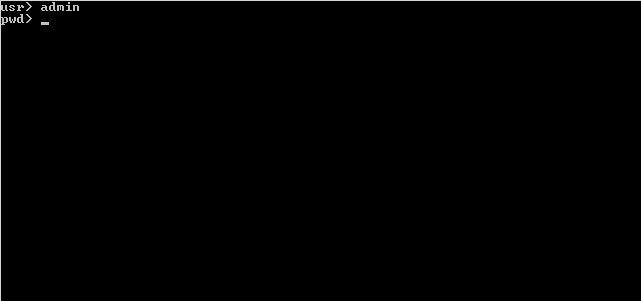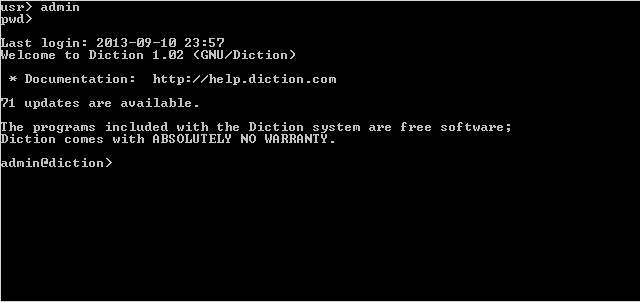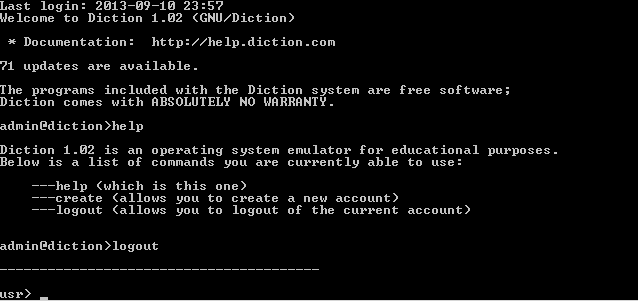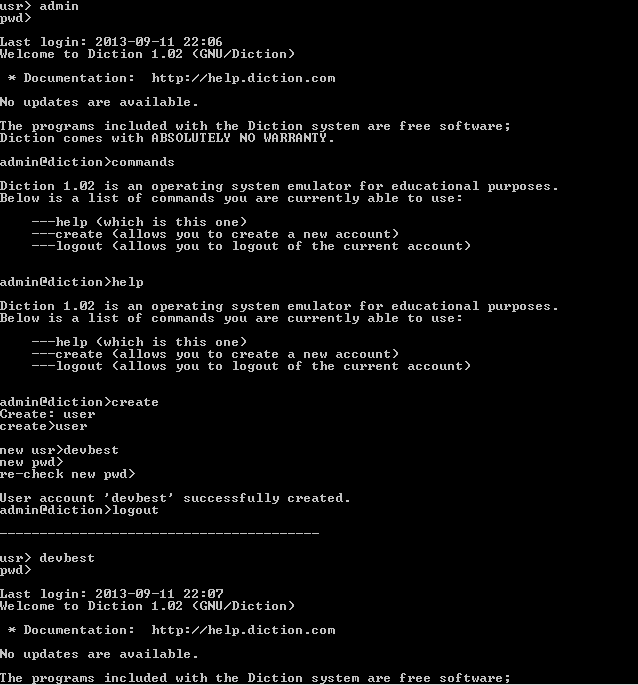Sway
Ruby and Python are married.
- Dec 19, 2010
- 194
- 76
Diction
What is Diction?
Diction is another Unix-like environment intended primarily for the use of learning how to operate a system through a command-line interface. It is intended to be very user-friendly and dependable.
Couldn't I just use Cygwin or an actual Unix based operating system?
Diction is not to be used how you would use any other system like it. You are using Diction primarily to learn how to use other systems like Cygwin and any other Unix based operating system.
What else?
Diction will package a whole load of different features that would perfectly introduce you to the world of CLI's. It will be fast, reliable, and will allow you to be just as productive (only probably not as much as you would with Cygwin).
Features:
** Functional user system. (login, logout, create users, delete users, switch users, set certain privileges, etc)
** Limited but flexible FMS (File Management System)
** HTTP web-server (disclaimer: very very basic)
** Common shell commands (commands like: cd, ls, etc.)
** Games and utilities (games like: Zork and stuff | utilities like: text editors)
** System configuration
Snippets:
Images:

(took Ubuntu's welcome message for the meantime)



Changelog:
September 11th:
** Added the 'commands' command to view the same information you would using the 'help' command.
** Re-factored some code. Removed some stuff that wasn't being used.
Notes:
** If you want to use something for actual production then go with something other than Diction.
** I have barely had much knowledge of all of this stuff before I started this and I am still learning it.
** Diction is not an operating system, nor is it even slightly an alternative for one.
** Diction is programmed in the Python language.
Thanks,
Jason Decastro
You must be registered for see links
|
You must be registered for see links
(coming soon)What is Diction?
Diction is another Unix-like environment intended primarily for the use of learning how to operate a system through a command-line interface. It is intended to be very user-friendly and dependable.
Couldn't I just use Cygwin or an actual Unix based operating system?
Diction is not to be used how you would use any other system like it. You are using Diction primarily to learn how to use other systems like Cygwin and any other Unix based operating system.
What else?
Diction will package a whole load of different features that would perfectly introduce you to the world of CLI's. It will be fast, reliable, and will allow you to be just as productive (only probably not as much as you would with Cygwin).
Features:
** Functional user system. (login, logout, create users, delete users, switch users, set certain privileges, etc)
** Limited but flexible FMS (File Management System)
** HTTP web-server (disclaimer: very very basic)
** Common shell commands (commands like: cd, ls, etc.)
** Games and utilities (games like: Zork and stuff | utilities like: text editors)
** System configuration
Snippets:
Code:
class Users(Login):
def create_user(self):
print()
new_usr = input("new usr>")
new_pwd = getpass.getpass("new pwd>")
new_pwd2 = getpass.getpass("re-check new pwd>")
if new_pwd == new_pwd2:
cursor.execute("INSERT INTO 'users' (username, password) VALUES ('%s', '%s')" % (new_usr, new_pwd))
conn.commit()
cursor.execute("SELECT * FROM 'users' WHERE username = '%s' AND password = '%s'" % (new_usr, new_pwd))
new_acc = cursor.fetchone()
if new_acc is None:
print()
print("Failure!")
krnl_obj = Kernel()
krnl_obj.kernel(Kernel.help_info, Kernel.commands, Kernel.create_commands)
else:
print()
print("User account '%s' successfully created." % new_usr)
krnl_obj = Kernel()
krnl_obj.kernel(Kernel.help_info, Kernel.commands, Kernel.create_commands)Images:

(took Ubuntu's welcome message for the meantime)



Changelog:
September 11th:
** Added the 'commands' command to view the same information you would using the 'help' command.
** Re-factored some code. Removed some stuff that wasn't being used.
Notes:
** If you want to use something for actual production then go with something other than Diction.
** I have barely had much knowledge of all of this stuff before I started this and I am still learning it.
** Diction is not an operating system, nor is it even slightly an alternative for one.
** Diction is programmed in the Python language.
Thanks,
Jason Decastro
Last edited:

